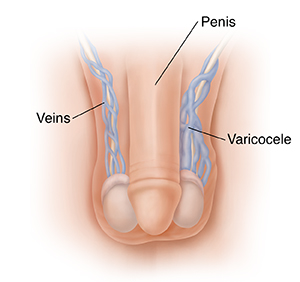Having Varicocele Embolization
A varicocele is a swelling in the veins inside the scrotum (the pouch of skin that holds the testicles). It may cause pain and swelling. It may also make you unable to have a child (infertility). Varicocele embolization is a procedure to treat the enlarged vein. Your healthcare provider will use a long, thin tube (catheter) and a tiny coil or medicine to block blood flow to the varicocele. The blood will then flow in the veins around the blocked vein. The varicocele will go away.

How to say it
VAR-ih-koe-seel
What to tell your healthcare provider
Tell your provider about your health history and all the medicines you take. This includes prescription medicines and over-the-counter medicines such as aspirin and ibuprofen. It also includes vitamins, herbs, and other supplements. And tell your provider if you:
-
Have had any recent changes in your health, such as an infection or fever
-
Are sensitive or allergic to any medicines, latex, tape, contrast dyes, or anesthetic medicines (local and general)
Tests before your procedure
Before your procedure, a healthcare provider will examine you and ask questions about your health history. This includes an exam of your scrotum and testes. They may also check your heart and lungs. You may have some tests such as an ultrasound exam of your scrotum and testes. This test lets your healthcare provider see the varicocele.
Getting ready for your procedure
Talk with your healthcare provider about how to get ready for your procedure. You may need to stop taking some medicines before the procedure, such as blood thinners and aspirin. If you smoke, you may need to stop before your procedure. Smoking can delay healing. Talk with your healthcare provider if you need help to stop smoking.
Also make sure to do the following:
-
Ask a responsible family member or friend to take you home from the hospital.
-
Don't eat or drink after midnight the night before the procedure, or as instructed.
-
Follow all other instructions from your healthcare provider.
You will be asked to sign a consent form that gives your permission to do the procedure. Before you sign, read the form carefully. Ask questions if something is not clear.
On the day of your procedure
Your procedure will be done by an interventional radiologist. This healthcare provider specializes in image-guided procedures. They will work with a team of specialized nurses. Ask your provider about the details of your procedure. The procedure often lasts 45 minutes to an hour. In general, you can expect the following:
-
You will be given medicine (sedation) to make you relaxed, comfortable, and sleepy during the procedure.
-
A healthcare provider will watch your vital signs during the surgery. This includes your heart rate, breathing, oxygen levels, and blood pressure.
-
You will get a shot (injection) of numbing medicine (local anesthesia) in your upper thigh. The medicine will control pain during the procedure.
-
Your healthcare provider will clean the site. They will then put a needle into a vein in your thigh. They will put a thin, narrow tube (catheter) into the vein.
-
X-rays will be used during the procedure. These help your healthcare provider move the tube to the correct place in your scrotum. Your provider may add dye (contrast material) into the vein. This helps make the X-ray pictures better. You may feel some warmth when it's done.
-
Your healthcare provider will use the catheter to put a small coil or a special liquid into the affected vein. This is called a blocking agent. It blocks the flow of blood to the varicocele.
-
The catheter will then be taken out. A bandage will be placed over the site where the needle was put in your thigh.
After your procedure
Your vital signs will be watched after the procedure. You will feel sleepy when you wake up. You will likely go home that same day.
Recovering at home
After the procedure:
-
You may have some minor pain. Your healthcare provider will tell you what to do to reduce the pain.
-
If you were given medicine to help you relax, you should not drive or make any important decisions for at least 24 hours.
-
You should be able to go back to your normal activities in 1 to 2 days. You should be able to go back to work in 5 to 7 days after surgery.
-
Don't do heavy activities or exercise for 7 to 10 days, or for as long as your provider says.
Follow-up care
Make sure you follow up with your healthcare provider after the procedure. If you were having problems with infertility, they may check your semen. You may need to have another procedure if the varicocele comes back.
When to call your healthcare provider
Call your healthcare provider right away if you have any of these:
-
Fever of 100.4°F (38°C) or higher, or as directed by your provider
-
Warmth, redness, swelling, or bleeding where the needle was put in your thigh
-
Pain that gets worse even after using pain medicines as prescribed
Online Medical Reviewer:
Marc Greenstein MD
Online Medical Reviewer:
Raymond Kent Turley BSN MSN RN
Online Medical Reviewer:
Rita Sather RN
Date Last Reviewed:
12/1/2022
© 2000-2025 The StayWell Company, LLC. All rights reserved. This information is not intended as a substitute for professional medical care. Always follow your healthcare professional's instructions.